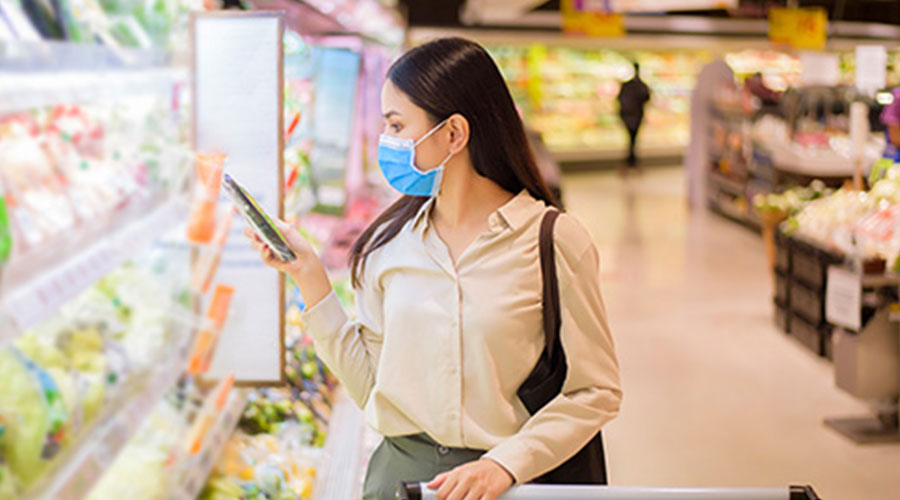Due to challenges such as severe weather conditions, limited fresh water resources and the geographical terrain, local food production in UAE has traditionally been minimal. Whereas the average annual food consumption per capita is estimated at 700 Kilograms, the UAE imports between 80 to 90 percent of the food it consumes[1] and in a bid to ensure continued supply, the UAE has made substantial foreign agricultural investments to produce food directly intended for the UAE market. Recently, a UAE-India Food Corridor was established, and UAE entities are expected to invest up to USD 7,000,000,000 in India’s food sector by 2022.[2]
However, with the Covid-19 pandemic and resultant disruptions in supply chains, UAE and other countries heavily reliant on food imports were forced to re-consider their existing strategies and have been spurred into taking steps for self-sufficiency.
“This pandemic has sent a strong message that diversification always has to be a key element of our future plans…… the virus is pushing us to come up with more innovative ways to grow faster than the rest of the world.”
– H.E. Dr. Thani bin Ahmed Al Zeyoudi, Minister of Climate Change and Environment
New Food Security Law
In pursuit of the above, Federal Law No. 3 of 2020 Regarding the Regulation of the Strategic Stock of Food Commodities (“Food Security Law”) was issued on 30 March 2020, aimed at organising food supplies in the event of emergencies and disasters and achieving food sustainability.
Key Features of the Food Security include:
- Establishment of a “Strategic Stock of Food Commodities” and “Safe Stock” in coordination with National Emergency Crisis and Disasters Management Authority (NCEMA);
- Establishment of a record of registration and classification of “Providers” (producers/importers, whether local or international) and “Registered Vendors” (local merchants practising commercial activities relating to food commodities);
- Maintenance and supply of Safe Stock by Providers and Registered Vendors, establishment of electronic connection with the concerned authorities for the purpose of follow ups etc., distribution of the Strategic Stock of Food Commodities by such Providers/Registered Vendors in case of emergencies, crises or disasters according to the distribution plans prepared by NCEMA in coordination with the competent local entity; and
- Management of the Strategic Stock of Food Commodities and warehouse by Registered Vendors, in warehouses within UAE designated for the food commodities, in compliance with the stipulations as to the location, area and size.
The Ministry of Economy has been designated the “Implementing Authority” under the Food Security Law and is conferred with the responsibilities/powers to implement the provisions thereof, including preparation of reports, studies and statistics, carrying out of economic evaluation of food commodities, estimation of the volume of consumption, determination of surplus and deficit, preparation of databases on production and availability of food commodities in the UAE and the countries of origin etc.
The Food Security Law also specifies various penalties for violations and non-compliance. For example, a Registered Vendor who violates the obligations thereunder may be subject to fines ranging between AED 500,000 and AED 2,000,000. Further, a person who is responsible for severing the electronic connection with the competent authority and NCEMA which ensures the continuous follow-up of quantities, varieties and status of the strategic stock of food commodities and who also violates the preservation and management of the strategic stock of food commodities will be punished with fines between AED 100,000 and AED 1,000,000. Anyone who violates the provision of the stock of strategic commodities in the event of emergencies, crises or disasters according to the distribution plans prepared by NCEMA in coordination with the competent authority, will be punished with imprisonment and a fine between AED 1,000,000 and AED 5,000,000.
National Strategies
In 2018, the UAE adopted the National Food Security Strategy 2051, which sets out 38 short and long-term key initiatives and is geared by 5 strategic goals focusing on facilitating the global food trade, diversifying food import sources and identifying alternative supply schemes, covering three to five sources for each major food category. The Emirates Council for Food Security was also established by the UAE Cabinet, comprised of representatives from various Ministries and the NCEMA.
Other national strategies include the UAE Water Security Strategy 2036 aimed at increasing water productivity[3], the UAE Aquaculture Pulse 2020 targeted at investment opportunities in the local aquaculture sector[4], the Food Tech Challenge which calls for development of innovative solutions for food production and management in the UAE with a prize money of USD 1,000,000[5], the UAE Food Bank launched in 2017, the Food Security Research Platform which is a repository of research in the field and information on key investors in the sector in the UAE, Ag-Tech Accelerator Programs etc.[6]
The Ministerial Decree No. 239 of 2018 on National Food Accreditation and Registration System mandates that food whether imported, locally produced or modified on its food label, ingredients or composition must be registered in the electronic system (ZAD), which is an integrated smart platform for food products data, before being handled in the UAE’s markets.[7] ZAD was developed jointly by the Ministry of Climate Change and Environment (MoCCAE) and Dubai Municipality to serve as the official online database platform for approval and registration food products.[8]
A National Rapid Alert System for Food was also put in place in 2017 to ensure proper implementation of response measures when serious food risks are detected, identify the mechanisms of managing food risk alerts as well as banning and lifting of bans on adulterated and misbranded food.[9]
Local Initiatives
The Abu Dhabi Agriculture and Food Safety Authority (ADAFSA) was established in March 2019 replacing the Abu Dhabi Food Control Authority, the Abu Dhabi Farmers’ Services Centre and the Food Security Centre – Abu Dhabi. ADAFSA is in charge of agriculture, food safety, food security and biosecurity in the Emirate, and manages and oversees emergency food reserves by cooperating with private sector entities that maintain food reserves.[10]
In June 2020, a Food Security Dashboard was launched in Dubai. Powered by Artificial Intelligence and data analytics, the Dashboard is designed to rapidly measure the five important indicators of food security being the supply index, stock availability, local production, consumption levels and the cost of vital commodities in the Emirate.[11]
Interestingly, the Dubai Multi-Commodities Centre (DMCC) in collaboration with CropData Technology Private Limited, India launched the ‘Agriota E-Marketplace’, which is a blockchain-based agri-commodity trading and sourcing platform, directly connecting Indian farmers and UAE food industry. The platform provides for trading of cereals, pulses, oil seeds, fruits, vegetables, spices and condiments, and is notable in its elimination of intermediaries, therefore optimising the supply chain and ensuring traceability. It is further reliant on a proprietary banking system with a multi-tier escrow structure, in order to guarantee secure transactions of funds.[12] In July 2020, DMCC also announced plans to replicate the successful business model behind its tea and coffee operation, by building a new infrastructure and logistics centre in JAFZA to attract, facilitate and promote the trade of cacao, pepper, chillies and spices, with the flexibly to expand to other agro-commodities.[13]
Opportunities
It is estimated that the total amount of food imported to the UAE during the first quarter of 2020 touched more than 3,500,000 tonnes, valued at over AED 13,000,000,000.[14]
In light of the Food Security Law and the various governmental incentives/schemes, it may be expected that food and agriculture companies from across the world will look to further invest in the UAE, by establishing a local presence, acquiring infrastructure and entering the food supply chain. These, combined with other existing laws such as the Federal Law No. 24 of 2006 on Consumer Protection as amended and Federal Law No. 10 of 2015 on Food Safety, will therefore serve to ensure food security and safety for the citizens and residents of the UAE.
In this regard, it is pertinent to note that the Positive List recently issued under the Federal Law No. 19 of 2018 on Foreign Direct Investment also includes agriculture, manufacturing, transport and storage, as well as hospitality and food services sectors.[15] Further, vide cabinet resolutions issued in 2005 and 2012, certain food/agricultural commodities were exempted from the ambit of Federal Law No. 18 of 1981 on Commercial Agencies (as amended), allowing such products to be imported/distributed throughout the UAE without the requirement for a registered commercial agent who is a UAE National.[16]
All of the above would therefore, generate further business for existing entities, particularly in farming, food production, food safety, ag-tech etc., and will serve to further cement the UAE’s position globally as a self-sufficient, sustainable and innovation-driven economy.
1 ‘How many kilos of food do UAE residents eat in a year?’ (Gulf News, 23 April 2020) last accessed 29 September 2020.
2 ‘UAE To Invest Up To $7 Billion In Joint Food Corridor: Piyush Goyal’ (NDTV, 16 October 2019) last accessed 29 September 2020.
3 ‘Ministry of Energy unveils UAE Water Security Strategy 2036’ (WAM, 27 September 2020) last accessed 29 September 2020.
4 ‘Minister of State for Food Security launches UAE Aquaculture Pulse 2020 guideline’ (WAM, 24 June 2020)
5 ‘UAE launches $1 million Food Technology Challenge’ (Gulf News, 23 September 2019) last accessed 29 September 2020
6 ‘Food Security’ (UAE Government Portal, Last Updated on 20 Sep 2020) last accessed 29 September 2020.
7 ‘Food Safety’ UAE (Government Portal, Last Updated on 10 Sep 2020) last accessed 29 September 2020.
8 ‘Sheikh Hamdan bin Rashid Al Maktoum launches the integrated smart platform for food products data in the UAE – Zad’ (MoCCAE, 18 February 2018) last accessed 29 September 2020.
9 Supra n.7
10 ‘UAE issues law establishing Abu Dhabi Agriculture and Food Safety Authority’ (WAM, 24 March 2019) last accessed 29 September 2020.
11 ‘Dubai launches Food Security Dashboard’ (WAM, 25 June 2020) last accessed 29 September 2020.
12 ‘DMCC Partners with CropData to Boost UAE-India Trade Ties through Agri’ (DMCC, 26 August 2020) last accessed 29 September 2020.
13 ‘DMCC to Expand its Coffee and Tea Centres with Target to Triple Output and Boost Dubai Trade’ (DMCC, 09 July 2020) last accessed 29 September 2020.
14 Supra n.1
15 Cabinet Resolution No. (16) of 2020 Determining the Positive List of Sectors and Economic Activities in which Direct Foreign Investment is Permitted and Their Percentage of Ownership.

